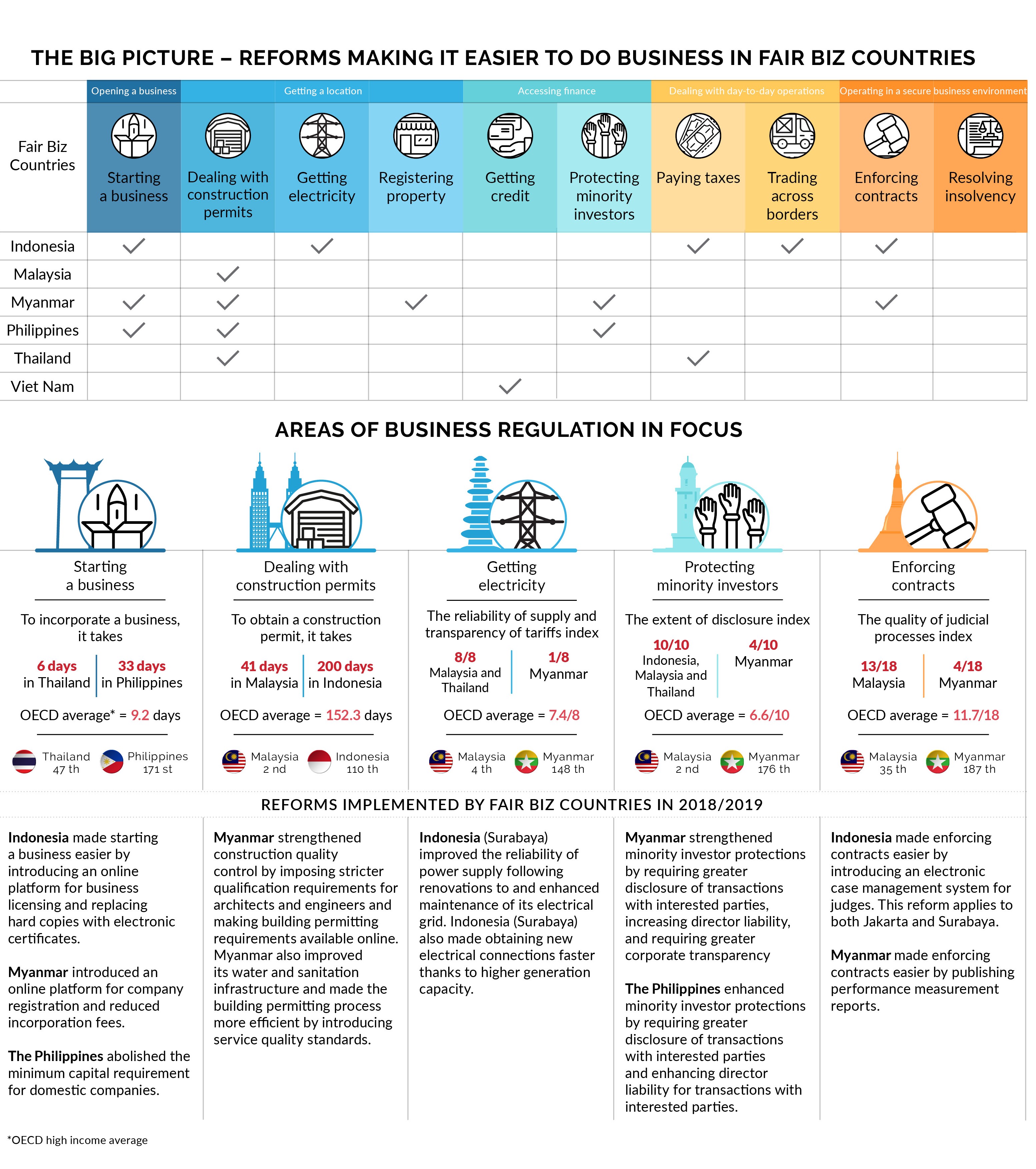PROJECT WEB PAGE: FAIRBIZ - PROMOTING A FAIR BUSINESS ENVIRONMENT IN VIET NAM
PROJECT SUMMARY
This project, carried out by the UNDP in cooperation with the UK government, aims to promote fair, transparent and predictable business environments in dynamic ASEAN countries. By working with both governments and the private sectors, the project focuses on six countries in ASEAN and Viet Nam is one of the priority countries.
The project will help develop transparent systems in both public and private sectors, champion responsible business practices, as well as strengthen rule of law and anticorruption mechanisms.
This is the first project to be funded by the UK Prosperity Fund in Southeast Asia, as part of its Economic Reform Programme. The UK Prosperity Fund will provide £1.2 billion globally to reduce poverty by promoting economic reform and development to boost inclusive growth in middle-income countries.
Learn more about FairBiz – Promoting a Fair Business Environment in ASEAN
Target countries: Indonesia, Malaysia, Myanmar, the Philippines, Thailand and Viet Nam
Project office: UNDP Bangkok Regional Hub
- New Anti-Corruption Law was adopted by the National Assembly at its 6 session on 20th November 2018 and came into effect on 1st July 2019 with a new Chapter on preventing & combating corruption in non-state enterprises and organizations.
- Consultation workshops, business forums on AC Law, the preventing and combating corruption in the private sector were organized.
- A study on codes of conducts and internal control mechanisms for enterprises were conducted.
- A module for training program of the Court Academy on handling international commercial disputes was developed.
- A hundred of judges, lawyers and justice officers
acquired new capacity on settling disputes through the application of international conventions by participating in the workshops and trainings we organized.
- Manuals on codes of conduct and internal control mechanism for business were developed.
- 152 companies have better understandings through a series of trainings on codes of conduct and internal control mechanisms.
- 300 judges have improved capacities on resolving international trade disputes.
- 14 business associations signed Business Integrity Pledge as a commitment towards social responsibility and accountability.
- According to the Viet Nam Provincial Competitiveness Index, the percentage of companies paying “informal charges” increased from 50% in 2013 to 66% in 2016, and slightly decreased to 53.6% in 2019. Another survey by the Viet Nam Business Forum in 2017 expressed foreign investors’ concerns that high corruption risk in Viet Nam poses huge challenges to multinational companies, which are required to comply with their rigorous domestic anti-bribery legislation.
- Moreover, companies’ trust in the state’s ability to detect corruption and prosecute companies engaging in it, is limited. The underlying figures show that corruption holds Viet Nam back, compared to other countries in South East Asia. This is revealed by global competitiveness rankings. According to the World Economic Forum’s 2017-2018 report, Viet Nam is 69st for Ethics and Corruption and 109th for Irregular Payments and Bribes out of 137 countries. The WEF Index shows that corruption is considered the third most problematic factor for doing business in Viet Nam.
- Another challenge in Viet Nam is the lack of capacity and skills to handle with commercial disputes and recognition and enforcement of foreign arbitral awards. The new trade agreements (like the EVFTA) will create opportunities to deepen economic cooperation between Viet Nam and partners. As a result, commercial disputes might increase not only in numbers, but also in complexity and diversity. Nevertheless, judges in Viet Nam have limited experience in handling these new types of dispute. Furthermore, the failure in recognition and enforcement of foreign judgments and foreign arbitral awards also has a negative impact on businesses investing in Viet Nam.
- Provide legal advice on the revised anti-corruption law as it relates to the private sector
- Support its implementation by developing guiding manuals and tools
- Support the institutionalization of Anti-Corruption Assessment indexes at the provincial and ministerial levels
- Provide capacity building for private companies and state-owned enterprises to adopt and apply codes of conduct and internal control mechanisms
- Improve the legal framework for dispute resolution
- Strengthen capacities of judiciary officers in handling disputes
- Promote peer to peer learning between judiciaries in Viet Nam and other ASEAN economies to enhance transparency in the court system
- Promote business integrity for new businesses (including startups) by capacity-building for mentors and young entrepreneurs, developing business integrity investment toolkit for investors, self-assessment toolkit for new businesses, and creating Business Integrity Chatbot
HIGHLIGHTS
READ MORE
- Helping non-state enterprises & social organizations implement Anti-Corruption Law
- Technological Application Can Help Improve Court Efficiency & Judicial Integrity
- Enhancing the Effectiveness of Investor-State Dispute Settlement in Vietnam
- Possibility to Apply the UNCITRAL Model Law in Viet Nam
- Training on Business Integrity & Innovation Entrepreneurship
- Equipping Judges of Viet Nam to Resolve Trade Disputes Fairly, Efficiently, and Effectively
- UNDP is More Engaged with the Business Sector to Enhance Business Integrity in Viet Nam
FEATURED DOCUMENTS
OTHERS
CONTACT US
Do Thuy Van
- Program Analyst
- UNDP Viet Nam
- Email: do.thuy.van@undp.org
Nguyen Nhu Quynh
- Inclusive Innovation and Youth Officer
- UNDP Viet Nam
- Email: nguyen.nhu.quynh@undp.org
Le Thi Thu Hien
- Program Analyst
- UNDP Viet Nam
- Email: le.thi.thu.hien@undp.org
Nguyen Thu Thao
- Communications Consultant
- UNDP Viet Nam
- Email: nguyen.thu.thao@undp.org
FOLLOW US
- Learn more about FairBiz – Promoting a Fair Business Environment in ASEAN
- Website: Business Integrity
- Facebook: UNDP Viet Nam
- Twitter: @UNDPVietnam
- Instagram: @undpvietnam
- Subscribe to UNDP Viet Nam Youtube Channel
---

 Locations
Locations
























